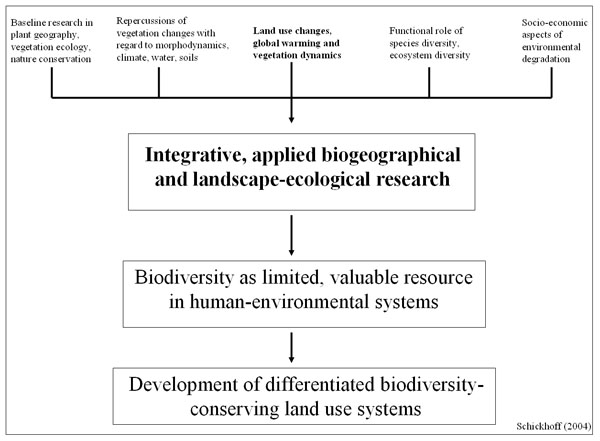Research / Projects
Research activities and project involvement/participation |
|
|
2020-2021 |
Feasibility study for a UNESCO biosphere reserve Desa'a Forest (DBU) |
| since 2014 | TRANSPAST: Rangelands of Kyrgyz Republic and Post-Socialist Transformation - Impacts of Land Use Changes on Condition and Future Availability of Pastoral Resources (BMBF) |
| since 2014 | ARBONETH: Arboretum-Netzwerk-Äthiopien (DAAD) |
| since 2013 | Sensitivity and response of the treeline ecotone in Rolwaling Himal, Nepal, to climate warming (DFG) |
| since 2012 | Restoration of the Wondo Genet Arboretum, Ethiopia, for biodiversity conservation and research (University of Hamburg) |
| since 2011 | Long-term optimization of water yield from the Qilian Mountains to the HeiHe River basin by an integrated development of water protection forests and land-use (Robert-Bosch-Stiftung) |
| since 2007 | Kaule e.V., an Organisation for Socially Sustainable Agro-Projects |
| 2003-2012 | The impact of the transformation process on human-environmental interactions in southern Kyrgyzstan (Coordinator of a joint project of the universities of Hamburg, Berlin, Bonn and several institutions in Kyrgyzstan (Volkswagen-Stiftung) |
| 2001-2007 | Changing pastoral ecosystems in western Mongolia (Khovd Aimag): a landscape-ecological approach for assessing grazing land degradation and grazing capacity (Volkswagen-Stiftung) |
| 2001-2004 | Biodiversity dynamics of salt grasslands in the Bodden landscape of western Pomerania, Germany (Coordinator of a joint project of the universities of Greifswald, Bremen and Berlin in the framework of BIOLOG-programme, BMBF) |
| 1997-1998 | Studies on vegetation-environment relationships in tundra ecosystems, Brooks Range Foothills, Alaska, USA (Max Kade Foundation) |
| 1992-1998 | Degradation of high altitude forests in northern Pakistan. Factors, processes and interrelationships in a regional man-environment system (Culture Area Karakorum Project, DFG) |
| 1989-1992 | Studies on landscape ecological differentiation and landscape change in Kaghan Valley, Pakistan, West Himalaya (graduate programme, University of Münster; DAAD) |
| 1986-1988 | Effects of forest use on structure and vegetation dynamics of mountain forests in Helambu, Nepal Himalaya (self-funded) |
Research strategy
In the frame of ongoing research on global environmental change, biogeography has increased its importance as an environmental science, in particular within international biodiversity-related research. Changing research foci, modified approaches and extended spectra of used methods, e.g., combinations of in-situ data sampling, remote sensing, and GIS-based modelling, are vivid illustrations of this development. Modern biogeographical research uses integrative approaches and focuses on multiple spatial and temporal scales when analysing
- structures and functions of complex communities, formations and biomes
- interrelationships between biotic and abiotic factors and processes
- causes and environmental implications of natural and anthropogenic habitat alterations
Humanity's impact on the environment prominently feature within the conceptual framework of modern biogeographical research. We adopt this focus in our research strategy and consider contributing to the concept of sustainable natural resource management and thereby mitigating the effects of global environmental change as an urgent research necessity of contemporary natural and social sciences. Our research perspective is based on the following premises:
- integrative biogeographical and landscape ecological research has to pursue holistic approaches since interdisciplinary collaboration between natural and social sciences is often the key for in-depth analysis of environmental problems and for adequate management conceptions
- the development of differentiated biodiversity-conserving land use systems as a top priority requires to place great emphasis on applied research questions, coupled with practically oriented implementation of results in order to achieve application relevance in landscape and urban planning, nature conservation and environmental management in developing countries
- internationally coordinated research programmes are necessary since human activities impact the global environment and biodiversity and have implications at various spatial and temporal scales; the integration of developing countries into research programmes and management strategies is of prime importance in view of predicted land use intensifications and aggravating biodiversity crises in those countries.
Based on these premises we integrate approaches of biosciences, geosciences and social sciences into a holistic biogeographical and landscape ecological research concept (Fig. 1). In this concept, biodiversity is perceived as a limited, valuable natural resource subjected to biotic, abiotic and anthropogenic influences and interrelationships.

Fig. 1: Biogeographical and landscape ecological research concept at the University of Hamburg
The research programme outlined in Fig. 1 includes some research questions the answering of which will be of growing importance in the next decades. We will focus on implications of land use changes and climate changes for major components of landscape ecosystems, in particular with regard to vegetation dynamics. Continuing our previous and ongoing research, our work centres on forest, tundra, steppe and mountain ecosystems with special consideration of polar and upper timberlines as climatic indicators.
